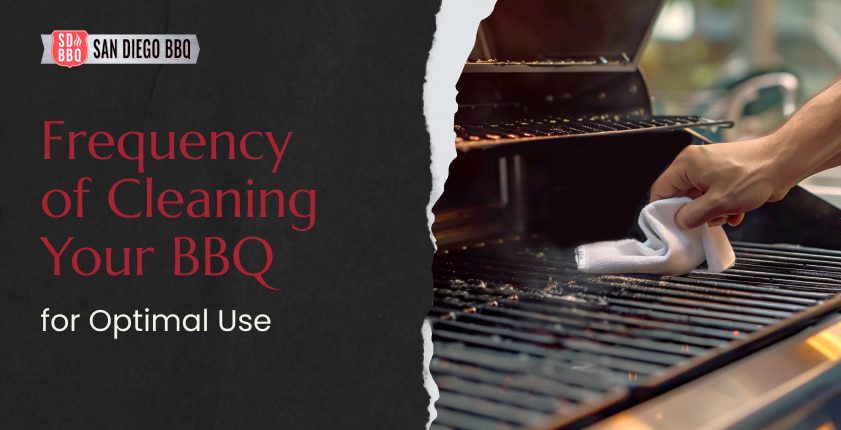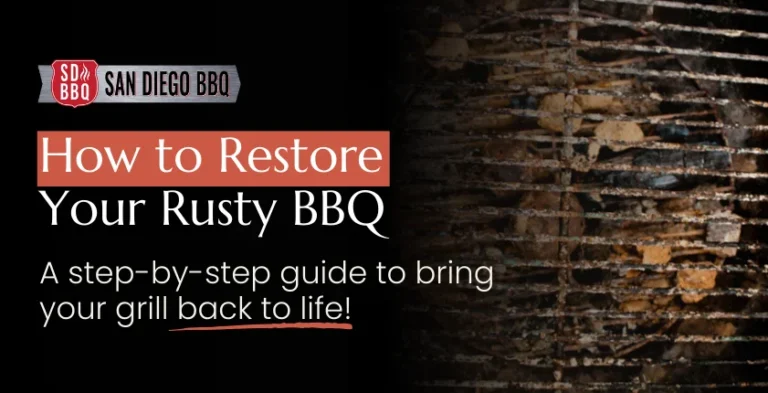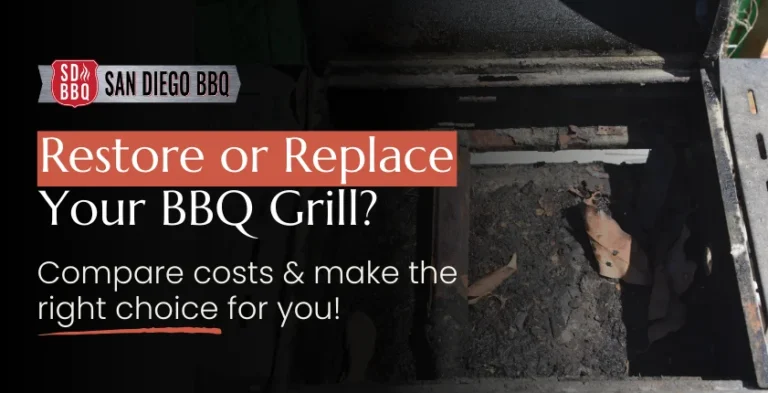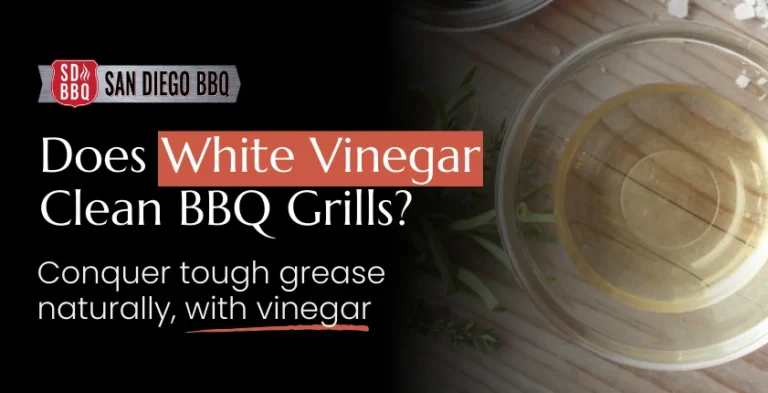“Hey, Dad! Do you mind if I invite my friends over for a barbecue?“
”Sure, but just remember, we haven’t cleaned the grill since last season! It might have a science experiment growing on it.”
Sound familiar? Nothing beats a good outdoor barbecue, but let’s be real—no one loves cleaning up afterward. Too often, we leave the grill dirty, promising to clean it “next time.” But let’s face it, “next time” usually means next season. And by then, it might be too late.
Neglecting your grill can lead to some serious barbecue blunders. A little dirt and grime are one thing, but when your grill is so caked with grease and gunk that it’s barely recognizable, you’ve got a problem. No one wants to serve up burgers that taste like last year’s cookout. Sure, your dad might joke that a little “extra seasoning” never hurt anyone, but let’s be honest—those burgers should taste fresh and delicious. So, how often to clean grills to keep them in top shape? We’ve got you covered with practical tips and benefits that’ll keep your grill—and your food—looking and tasting great.
Follow our guide, and your dad will never have to say, “Maybe you should order pizza instead.”Get ready for legendary backyard cookouts!
Why Regular Grill Cleaning Is Essential
If you’re tempted to skip cleaning your grill right away, let us convince you why you shouldn’t. The timing of when to clean the grill directly affects its future condition, including:
- Preventing Build-Up: Over time, grease and food residue accumulate on your grill grates. Regular cleaning removes these residues, preventing build-up that can obstruct airflow and cause uneven heating, leading to corrosion or rust.
- Ensuring Safety: Do you wonder what happens if you don’t clean your grill? It poses safety risks, as grease build-up can cause flare-ups and bacteria growth. Cleaning your grill reduces these risks, creating a safer cooking environment.
- Maintaining Efficiency: A clean grill operates more efficiently. Removing debris allows for better heat distribution, resulting in more consistent cooking temperatures. It also reduces the likelihood of hot or cold spots on the grill surface. Knowing how often to clean the grill ensures you maintain optimal performance every time you fire it up.
- Enhancing Taste: Residue build-up on grates can impart off-flavors and contribute to unpleasant odors. Keeping your grill clean preserves the natural flavor of your food, ensuring it doesn’t have any foreign tastes or smells. Your guests will always delight in your dishes.
You should clean your grill after every use–this helps to maintain optimal performance and safety. Additionally, you should perform a thorough deep clean at least once a month or more frequently if you use your grill heavily. By following a regular cleaning schedule, you can enjoy delicious, perfectly grilled meals, and ensure the longevity of your BBQ.
How Often Should You Clean Your Grill
Do you have to clean the grill every time? It’s a common question, and the answer is yes. Cleaning your grill after every use is crucial to extend its service life. However, various factors should be considered when cleaning your grill. Here are some guidelines to help you maintain your grill effectively
- Regularly Deep Cleaning: In addition to light washing after each use, schedule a deep cleaning at regular intervals. This thorough maintenance involves disassembling the grill to clean the burner tubes, heat diffusers, and grease traps.
- Should You Clean Your Grill After Every Use: It’s essential to give it a light wash after each use to remove food residue and prevent build-up. Use a grill brush to scrub warm grates, keeping the grill hygienic and preventing debris from hardening, which can be more difficult to remove later. A more thorough cleaning is also recommended regularly.
Understanding how often you should clean your grill is vital to keeping it in top condition and prolonging its service life.
Consequences of Neglecting Grill Maintenance
Neglecting BBQ maintenance can lead to several consequences. They affect its performance and the food quality. Here are some potential risks:
- Flare-Ups: Grease and food debris on surfaces can ignite during cooking, resulting in unexpected flare-ups. These flare-ups pose safety hazards and can cause charring and uneven food cooking.
- Uneven Heating: Debris build-up obstructs airflow and heat distribution within the grill. You may experience uneven heating. Some regions may be hotter or cooler than others. This can lead to inconsistent cooking and distasteful results.
So, how often should you clean your grill? Deep washing is necessary once or twice a year. It helps prevent severe consequences, ensuring the longevity of your BBQ.
Best Practices for BBQ Maintenance
We have prepared some expert tips for you to use for effective BBQ maintenance. Among them are:
- Use the Right Tools: Invest in quality cleaning tools. Buy a sturdy brush, cleaner, and scrubbing pads. Consider using a degreaser designed explicitly for BBQs for deep cleaning.
- Inspect for Damage: Regularly inspect your grill for signs of wear and tear, including rust, corrosion, and loose parts. Address any issues promptly to prevent further damage.
- Cover When Not in Use: Protect your BBQ from the elements by using a cover when it is off. This helps prevent rust and prolongs the lifespan.
Regular maintenance is crucial for preventing common grill problems:
- Do you have to clean the grill every time? A thorough washing up isn’t mandatory after each use. Light cleaning prevents residue accumulation and maintains peak performance. Regular deep washing up cuts grease, debris, and carbon deposits. They can compromise the efficiency and safety of your grill over time. This comprehensive maintenance routine ensures it remains in top condition. It is ready to deliver mouthwatering grilled delights whenever you fire it up.
- When to clean the grill? Aim to wash it after each use. This prevents residue build-up. Schedule a deep clean at least once a month or as needed, depending on usage. Follow these best practices to keep your BBQ in top condition. You will enjoy delicious grilled meals for years.
Seasonal and Post-Use Cleaning Routines
A seasonal washing-up schedule for San Diego’s climate ensures your BBQ stays in top condition. Check out the information on how often you should cover your grill:
- Spring: Start the grilling season with a thorough clean. Remove the grates and wash them with warm, soapy water. Scrub the burners, heat deflectors, and grease traps. Inspect for damage or wear.
- Summer: Perform light cleanings after each use. Remove residue from the grates with the brush. Wipe down surfaces with a damp cloth. Cover the grill when not in use to protect it from the sun.
- Fall: As temperatures cool, continue with post-use cleaning practices. Check for any signs of rust or corrosion. Address them promptly. Store BBQ accessories indoors to prevent damage.
- Winter: Before storing the grill for the season, perform another deep clean. Remove grease and debris. Cover the grill securely. Consider using a cover throughout the winter. It protects BBQ from rain and moisture.
Post-cooking cleaning practices:
- After each use, brush the grates. Do it when they’re still warm to remove food residue.
- Wipe down surfaces with a damp cloth to prevent build-up.
- Empty grease traps regularly. It avoids grease accumulation and potential flare-ups.
How often should you cover your grill? Ideally, cover it whenever it’s not in use. It protects it from the elements and prolongs its lifespan.
Dealing with Tough Grill Residues
When facing harsh grill residues, try effective solutions. Among them are:
- Vinegar and Baking Soda Paste: Mix equal parts of each component. Apply it to the affected areas. Then, let it sit for an hour before scrubbing it with a brush. This is a perfect natural abrasive that helps break down grease and charred food particles.
- Steam Cleaning: Heat your grill to a high temperature. So you’ll lose residues. Then, use a steam cleaner. It will blast away grease and grime. Steam cleaning is an eco-friendly and efficient method.
- Onion Method: Cut in half and rub it across the warm grates. Its natural enzymes help dissolve grease and lift off residues.
How often should you clean your BBQ? Aim to wash it after each use. This measure will prevent residue build-up.
Choosing the Right Cleaning Supplies and Tools
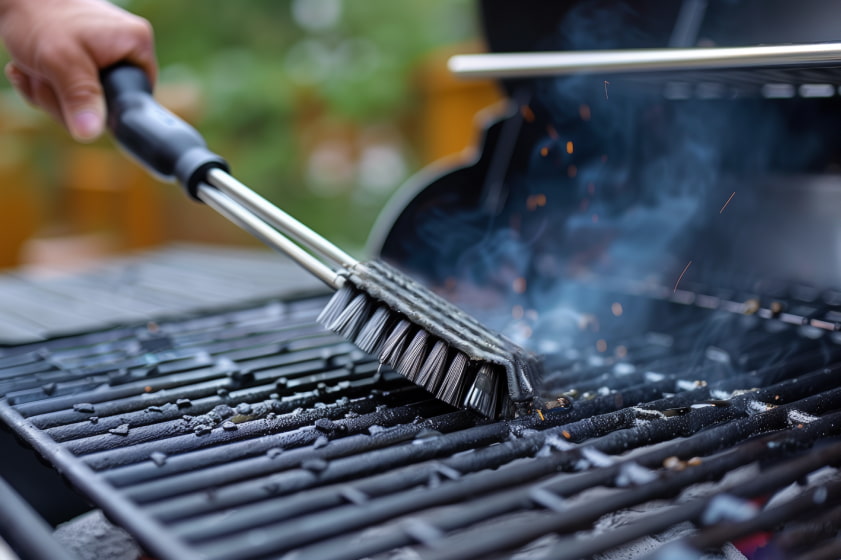
When it comes to choosing the right cleaning supplies and tools for your BBQ, consider the following options:
- Brush: This is essential for removing food residue and debris from grates. Look for a brush with sturdy bristles and a long handle. They are vital for easy maneuverability.
- Scraper: This device is ideal for tackling stubborn residue. It perfectly removes grease build-up on grill surfaces. Opt for a durable metal blade scraper. It won’t damage the surfaces.
- Scrubbing Pads: How to keep your BBQ clean? Use scrubbing pads or abrasive sponges. They help to clean hard-to-reach areas and remove tough stains. Choose pads made from materials that are safe for use on surfaces.
- Natural Cleaning Solutions: Eco-friendly options include vinegar, baking soda, and lemon juice. They can create homemade cleaning solutions. These natural ingredients are safe for your grill and the environment.
- Cleaner Spray: Convenient for quick touch-ups and spot cleaning. Choose a grill cleaner formulated to dissolve grease and grime without harsh chemicals.
Addressing common questions:
- How often should you clean your BBQ? Do it after each use. So you’ll prevent residue build-up and maintain hygiene. Schedule a deep cleaning at least once a month or as needed. Everything depends on usage. You must use effective, not harmful, washing products. So you won’t damage the surfaces. It’ll result in increasing the life and suitability of your device.
- What happens if you don’t clean your grill? It can lead to severe consequences, such as grease build-up, flare-ups, and uneven heating. Also, it reduces the lifespan of your BBQ. Regular maintenance is essential for optimal performance and safety.
Prioritize those labelled as grill-safe and environmentally friendly. Avoid harsh chemicals or abrasive cleaners, which damage surfaces and the environment.
Long-Term Benefits of Keeping Your BBQ Clean
Keeping your BBQ clean offers numerous long-term benefits. Among them are:
- Extended Lifespan: Regular cleaning prevents grill components’ corrosion, rust, and deterioration. It prolongs its lifespan.
- Optimal Performance: A clean BBQ operates more efficiently, has better heat distribution, and produces fewer fires. This results in more consistent cooking temperatures and improves food quality.
- Enhanced Cooking Experience: A well-maintained BBQ provides more enjoyable cooking. It allows you to grill confidently and precisely. You can focus on perfecting your recipes. You mustn’t worry about uneven heating or off-flavors. This is because of the residue buildup.
- Food Safety: Regular cleaning helps prevent cross-contamination and bacteria growth. It ensures that your dishes are safe to eat.
- Cost Savings: Washing saves you money in the long run by avoiding costly repairs or premature replacement.
Follow these tips on how to keep your BBQ clean, and you will reap the benefits. If you have any difficulties with this, please contact us. With us, you can get quality services at affordable prices. We employ exclusively professionals in their field. We provide a guarantee for our work. Your BBQ will be sparkling clean. And who knows, you might just pass down your BBQ hero status to the next generation!


